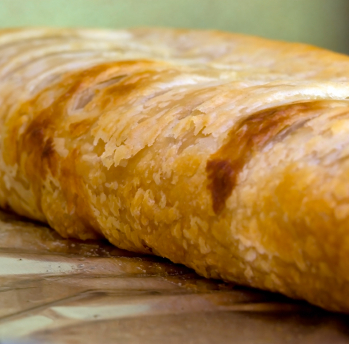|
My father was a Manhattanite — an urbane New Yorker of gin Gibsons and Yma Sumac, who had Mitteleuropish roots and a torrid affair with The Modern Jazz Quartet, pastries, and schlag. This was the 1960s, just twenty years after the War, when it was hip to be a British musician playing in a club in Hamburg, or a Jewish businessman going for an unmolested stroll down the Kartnerstrasse. During those Mad Men days of after-work cocktail parties and three-martini client lunches, my father’s dinner, wherever it was eaten — either near his office in The French Building on Fifth Avenue or at home in Forest Hills — was punctuated by a visit to a tidy little Hungarian bakery on the Upper East Side, called Mrs. Herbst.
There was a certain sense of pride, ownership, and even familial comfort to ending meals there: my father’s mother had come to the United States in 1899, from a pastry-laden land that was decimated during World War II. My father’s uncle had settled in the 1920s in Vienna’s Oberdobling neighborhood, fleeing just before the Anschluss. My mother’s maternal grandparents had come from Budapest in the late 1800s; while I have no recollection of their daughter — my grandmother — ever baking (she was a strict roast chicken and goulash woman), she apparently was such a practiced strudel maker that she could roll out sheets of dough so whisper-thin and wide that they’d drape over the edges of her dining room table, like a linen tablecloth. I never saw her do it because, once she discovered Mrs. Herbst before I was born — thanks to my father — she didn’t have to. People who frequented the bakery were Landsman of a modern sort; they were cut from the same pastry-loving, New York, Mitteleuropish cloth that was wistful, proud, and hungry for a sweet connection to their past.
In truth, there was no love lost between my father and his mother-in-law, but they did have an understanding: if he was going to Mrs. Herbst, he would return home with a long, white pastry box housing a foot-length of still-warm strudel for her. On the nights when my mother and I went with him, he’d park outside my grandmother’s apartment building (which was right across the street from ours) and send me upstairs with it. People in the elevator swooned.
One night, with my father’s Buick idling downstairs, my grandmother opened the box, sliced off a small piece of strudel and handed it to me on a paper napkin.
Elissala, try it—
I took a bite while she watched my face.
I was expecting apple. I got cabbage.
I was eleven.
You can imagine my dismay.
Grandma, I choked–this isn’t apple!
I adored her, and she, I. We were very protective of each other, and I didn’t want her eating anything that seemed so dangerously counterintuitive. I was certain that this stuff that we’d brought home for her from the prim Mrs. Herbst was just a huge and terrible gastronomical error. Someone in the kitchen had clearly screwed up. My grandmother just smiled.
“Cabbage strudel is the best thing,” she said, wagging her finger at me. “Nothing better.”
A few years later, Mrs. Herbst closed, and there was no more cabbage strudel in my life, or my grandmother’s. One of the original Herbst bakers opened up a small bakery down the block from us in Forest Hills — Andre’s; it’s still there — but once my grandmother’s ethno-culinary connection to her Hungarian roots closed its doors, that was it: cabbage strudel became nothing more than a memory both for her, and for me. She never talked about it after that, and I never thought about it again. She died suddenly, a few months after I left for college; I boarded the Eastern shuttle at LaGuardia and waved goodbye to her. And just like that, she was gone.
In 2005, I read a New York Times article by Nora Ephron which started with words that chilled me:
Food vanishes.
Of course, this is true. And if you live long enough in New York, the foods that you take for granted, that you assume will always be there, invariably disappear. Hot chestnuts — the kind cooked over an open flame instead of under a tanning lamp clipped to a kiosk selling fake Chanel handbags — on Fifth Avenue. Egg creams made by an old man who wouldn’t know a hipster from a dumpster. Ebinger’s blackout cake. Rye bread from Jay-Dee Bakery. A slice of oily, dripping pizza from the tiny pizzeria across the street from my childhood apartment. A potato knish from the original Knish-Nosh, which is now a Starbucks. Date nut bread and cream cheese sandwiches at Chock Full O’Nuts. Holsteiner Schnitzel at Luchow’s. Warm croissants at Dumas. Lee Lum’s lemon chicken, at the original Pearl’s.
Gone. All of them.
Vanished. Just like that.
When I read Nora’s piece about my grandmother’s beloved cabbage strudel, I was stunned in the most visceral of ways. I sobbed and read it again; I hadn’t thought about cabbage strudel, or Mrs. Herbst — the place that was so vitally important to my father, to my grandmother, and to us as New Yorkers — for years. And I realized why — though I loved Nora’s work for its pitch-perfection and its timing and its subtle, sad brilliance and hilarious humanity — I had always felt such a profound connection to her: Nora Ephron was a Landsman.
She would, I was sure, know to always order a round knish, and not a square one. She’d never order her pastrami on white. She loved Mrs. Herbst, and she loved my grandmother’s favorite cabbage strudel. Nobody loved my grandmother’s favorite cabbage strudel. When I read that article, Mrs. Herbst’s bakery was alive again. And so was my grandmother.
Nora was a fixture in the city we shared. She absorbed its humor and pathos and food in one fell swoop. Nora was like the breath that you never have to think about taking, but that you always do, no matter what.
The night that the news of her death officially hit the wires — she would say wires, right? — I was having dinner with my mother in a pseudo-French bistro half a block away from The Apthorp, the mammoth apartment building where Nora lived for so many years until the day she came home and discovered that her rent had gone up to $12,000 a month. Whenever I walk past The Apthorp, I always think of her and the New Yorker article she wrote about living there. It was around 7 pm that night and the crowded restaurant was filled with people like me who were checking their email on their cell phones. My mother was talking loudly about her chicken-under-a-brick. Suddenly, everyone seemed to gasp all at once, and the place went silent.
What? my mother asked, chewing on a roll.
She’s gone–I whispered, looking at my phone.
Who’s gone?
Nora Ephron–
My mother shook her head.
That can’t be right, she said.
But like the things that made my New York my New York — cabbage strudel, Mrs. Herbst, my grandmother — Nora was gone. Vanished.
Just like that.

 m
m n)
n) t
t )
)





